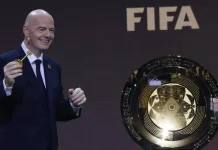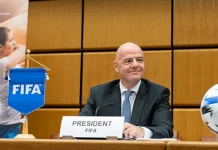The current financial ecology of FIFA is built around mega-events that guarantee huge revenues in the area of broadcasting rights, sponsorship contracts, and economic links connected with development of the infrastructure. The men’s World Cup, 2026 (the biggest in the history involving 48 teams spread across the three countries of the United States, Canada and Mexico) is expected to generate record amounts in terms of revenues. Such economic incentives are bound to affect decision making and the builders will ensure that nations with developed infrastructure as well as a high level of investment appetite are preferred.
The influence of financial logic on governance decisions has precedent. The 2022 World Cup in Qatar, where workers were killed or under serious labor rights abuse, went on without any binding human rights assurances. The FIFA was globally challenged on the failure to hold Qatar accountable deeper than apparent conformance. In 2025, FIFA is again accused, in a formal legal complaint filed by a group of international lawyers, of reprising this strategy with Saudi Arabia, where the plans to host the 2034 world cup have re-focused attention over repression, exploitative labour, and an absence of worker rights. When it comes to financial feasibility and geopolitical partnerships, the focus seems to be chosen over human dignity; a fact that highlights the expanding gap between the human rights responsibilities of FIFA and its business objectives.
Geopolitics and the Host Selection Narrative
Hosting selection and tournament expansion remain aligned with the powerful or emerging states and that is done, according to the strategic direction of FIFA. These choices are diplomatic and reputational in nature, and may suggest acceptance or legitimization of controversial regimes. The transactional nature of such relationships can be seen through the interactions of president Gianni Infantino with other high-profile officials including the Saudi Crown Prince Mohammed bin Salman and former president of the U.S. Donald Trump.
The inconsistent dealing with world affairs also makes FIFA look bad. The suspension of Russia from competitions due to its contribution to the war in Ukraine in 2022 is compared to the lack of any comments by FIFA on other arising problems around the world, including human rights abuse in Saudi Arabia or the way Palestinians are treated in the context of their increasing tensions in 2025. This trend lies in the unequal application of ethics that is not based on principle but strategical usefulness.
Human Rights Commitments and the Reality on the Ground
The Disparity in FIFA’s Human Rights Framework
In the policy on human rights released by FIFA following the UN Guiding Principles on Business and Human Rights, there were human rights commitments to freedom of expression, labor related rights, and non- discrimination. These values were imbibed in the 2026 host bidding process where the candidate countries will be required to give guarantees on maintaining international standards.
However, as much as there are these commitments, implementation is at a superficial level. In the year 2025, Amnesty International and Human Rights Watch reports suggest that there were still serious gaps in the process of monitoring and enforcement with some hosts falling short of even the most basic protection of migrant workers. The compliance has not been enforced even by the own oversight bodies of FIFA and the grievance redress mechanisms have either been inaccessible or ineffective.
A microcosm of this disconnection was the 2025 Club World Cup to be held in the United States. Earlier campaigns publicizing anti-racist policies and inclusion of LGBTQ + were abandoned by FIFA unceremoniously with the choice of generic unity slogans. They have accused FIFA of silencing its message of social justice to take up a spot or keep its commercial relations with stakeholders in the host country through the rationale of a strategic retreat out of accountability, which advocacy groups branded as a suit of affinity to money.
Impact on Players, Workers, and Fans
Workers’ fairness is still one of the most important human rights issues in FIFA event facilities. The precarious nature of the work migrant workers do in building infrastructure aimed to host tournaments still remains with regard to the number of working hours, minimal pay, and unhealthy working conditions. Reforms that have been promised in the Gulf have been produced by inconsistent results and there is increased concern that similar patterns may also develop in Saudi Arabia as the country intensifies painstaking measures in preparation for 2034.
Players are not an exception since they find themselves trapped in this circle. Although certain sportsmen/women are utilizing their popularity to voice their rights, claims, and representation, they are also not taken seriously or indirectly oppressed by the laws of FIFA that discourage the subject of politics in the fields. Fans also experience restrictions: suppression of protest and expression in authoritarian host countries to the aesthetic denuding of football through its exclusive identity being edged out by justice-motivated projects.
Governance Challenges Undermining Accountability
Ethics, Transparency, and Power Dynamics
The system of governance still lacks transparency and inner accountability in FIFA. The Ethics Committee, which is meant to regulate the issue of misconduct and corruption, has not been able to detach itself with the political influence and lack of conflict of interest. Whereas the scandals in the past created pledges to reforms, the 2025 prospect depicts a picture of stagnancy.
Whistleblowers in FIFA have even accused the organization of decision making related to the host selection process, as well as disciplinary measures, being arranged under the minimum supervision, reinforcing doubts about the independence of this organization. The fusion of powers into the hands of one man (the president), the lack of autonomous controls over its finances and a lack of transparency in its financial reporting each negatively affect FIFA as an institution that may be admired as an impartial and honest custodian of the sport.
Pressure to reform has also been on the increase. The players unions and civil society organizations say that structural change is essential, i.e. democratizing decision-making, bringing in the experts in human rights within governance institutions, and finally open impact assessments to major events. In the absence of such initiatives, the pledges of FIFA are not likely to be based in practice.
The Global Backlash and Calls for Reform
Rising International Pressure and Legal Challenges
The tendency of investing in commercial issues at the expense of acknowledging human rights has resulted in increased foreign concern. Global human rights networks including the Sport & Rights Alliance, and FairSquare, have mobilized parallel advocacy efforts to compel enforceable standards to be applied to tournament hosts. Legal petitions filed with European courts aim to oppose the Saudi World Cup award based on human right premises, which, in turn, can set new precedents in matters of sport-governing responsibility.
International media, such as Le Monde, The Guardian, and Die Zeit, are still unfolding the mysteries that surround the FIFA activities as the people question whether world tournaments will continue to enjoy legitimacy without incorporating stronger regulatory structures in ethics. The attempts by high-profile sponsors to issue statements underscoring the necessity to better align the operations of FIFA with established norms of human rights, globally accepted, indicate that commercial stakeholders may be seeing change in their expectations.
Balancing Act for the Future of Football Governance
The conflict that cuts to the heart of FIFA in 2025 is the balancing of its two identities, some of ethical regulators, and some of commerce operators. These system weaknesses are represented by the discrepancy between high moral ideals and geopolitical and economic powers at be. The current human rights frameworks need to shift to obligatory, monitored processes rather than box-checking contractual frameworks to be observed over the entire lifecycle of the event, that is, the bidding phase through to legacies.
The leadership at FIFA has recognized the existence of such a tension but is unwilling to make change a priority unless it risks immediate profits or relationships. These contradictions can be expected to remain unless controlled by an independent oversight, and with the direct involvement of all the stakeholders such as the labor unions, grass roots organizations, and rights experts.
Harnessing Football’s Global Influence Responsibly
Football remains a uniquely powerful vehicle for shaping cultural and political narratives. Its emotional reach, demographic breadth, and media saturation give FIFA unparalleled influence over how nations and communities see themselves and each other. This power should not be exercised carelessly.
FIFA’s future relevance will hinge on how convincingly it navigates the intersection of governance, ethics, and commerce. Creating an environment where rights, dignity, and equity are foundational—not optional—will be essential to restoring credibility. This includes re-centering the sport around the people who animate it: workers, players, and fans.
The events of 2025 have illuminated the widening chasm between FIFA’s stated human rights commitments and its political and commercial behavior. As legal challenges intensify, civil society mobilizes, and tournament legacies are debated more than celebrated, the pressure on FIFA to evolve its governance model grows sharper. The decisions it makes over the next two years—particularly as the 2026 World Cup approaches—will signal whether football’s global leadership can rise to meet a new standard of ethical responsibility or remain entrenched in the transactional patterns of the past.












